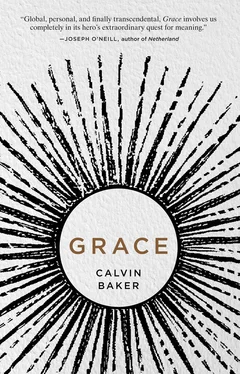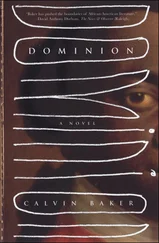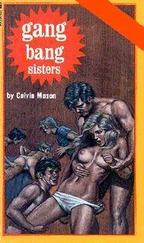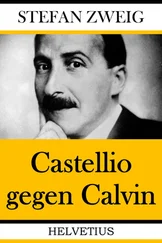I feared making a fool of myself, but my self-consciousness quickly gave way to laughter, although Sylvie took glee in ribbing me.
“Señor Roland is clever,” she said, as I mimed a title. “For a gringo.”
Her aunt began to reprimand her, but stopped when she saw Mr. Saavardra shake his head in bemusement. We played the levitation game after that, and everyone was full of pleasure and the oxygen-rich ocean air increasing our majestic mood.
Mrs. Maldonado, who reminded me of Bea, was inspired to sing, and soon we all were. When I heard Sylvie sing I was surprised by the strength of emotion in her voice. Not for the first time that night, I found myself trying to reconcile the qualities about her I did not like with the feeling here was a person of substance. As I listened to her sing I also wondered what shelter she had lost, what child of hers murdered, or gone astray, what husband she witnessed wither with work, to make her sound so ancient and wise.
“Harper,” Thiago asked, the formality having melted hours earlier. “Do you by chance play tennis?”
“Not well,” I said.
“We have a lovely court,” he offered, “which you should feel free to use.”
“I saw it when I arrived, it is a lovely court. Thank you.”
“While the weather holds, please feel free to play whenever you wish.”
“Would you like a game?” I asked. “As long as you don’t beat me as badly as you did at bocce.”
“I’m afraid my knees do not allow me to play much anymore, and when I ignore their advice it is my pride that puts an end to it. Sylvie is quite accomplished, though.”
“You played competitively?” I asked.
“Not seriously,” she said modestly, “but I played.”
“When did you stop?”
“When my father lost all his money.”
“I’m sorry to hear that.”
“No, it made me know something about life.” She looked me directly in the eye with the full, steady gaze of someone who has done copious self-reflection. “What it means to have things, and what that is worth. What it means to lose them, and be without, and what that teaches you. But mostly, what it means to dream and to chase recklessly.”
“He get what he was after?”
“It cost him a family.”
She did not say it with bitterness, but a matter-of-fact evenness that touched me that much more. I did not know whether her sadness was in the past and healed or permanent, but she seemed sterling clear, without either illusion or anger, and there was no question that I liked her. Not with lust, simply the way some women make you think about family.
“Do you still enjoy the game?” I asked, turning the conversation back to tennis, and our plans for the next afternoon.
“I enjoy what it shows about people,” she answered, with what seemed to me a challenge.
“Don’t be lulled,” Mr. Saavardra cautioned. “If she offers you a wager, don’t accept.”
“I won’t bet,” I said, “but I’ll play.”
She and I talked in the airy living room a while longer, sometimes disagreeing strongly, but whenever she laughed I saw how alive and free she could be, which softened any edge.
When our conversation broke off we looked around to see everyone else had gone to bed. Realizing we had talked so intently, we grew awkward and I stood to say goodbye. She looked at me full and steady again and smiled with the transparency of those who might see us fully, and I was arrested another moment, sensing some unseen possibility and abundance just out of reach.
There was nothing dramatic; a tiny lunette opened — unformed desire — until our shared question — fear, uncertainty, caution — was whether we would leap through the high, small pane or flee. It was a feeling I knew not to trust. The pain of erring was too much.
We broke apart — the tension between us alive enough to name. The current was soon replaced by awkwardness, as I thanked her for her family’s hospitality and excused myself to walk back around to my own side of the island; feeling, as I made my way through the dark, the quick pulse of want and hope from some other body hidden within me that wished to override the rest with its own certainty. I silenced it with the simple, rational knowledge that I did not know her. It was merely something in my subconscious that had caught and fought back irrationally, and difficult to resist.
Thiago answered the door the following afternoon when I arrived.
“I hope we did not keep you up last night,” I apologized, as we waited for Sylvie in the vestibule.
“I am sorry we did not say goodnight,” he said. “But we did not wish to interrupt your conversation. You know, Sylvie is an excellent person, a deeply good woman.” He nodded thoughtfully. “The women on that side of the family can be real forces.”
“Friends should not be involved,” I said.
“True, but men and women need each other. What are rules in the face of that? Some of them matter some of the time, and others are arbitrary. Even those that matter become irrelevant when you have in mind the thing you must do in work or life. There is no authority above that. Power, consequences, perhaps. Authority? Not for people who know what they are about. You elect your values and burdens and way of being after considering carefully the options available to you, and their cost. Who is great serves what is great, and pays the cost. Who is less, serves something less and pays for that. But I think you know this already. It is something we hear in the first part of life, and only understand in the second.
“I trust you, in any case, to know what you are about. If you do, everything else is in compliance. Things will work out or not. The rest, only the two of you can determine: whether she is whom you would be responsible to, and entrust with your life, and vice versa. If so, the only thing for me or anyone to say is, Olé, señors .
“If she is not, you will know in an afternoon, and she will know inside an hour. Whatever this true voice says, you will abide by. That is the way to be gentle with each other. You are young, enjoy your game.”
“Thank you,” I said, as Sylvie entered the hall breathlessly. His exhortation in another context might have made me apprehensive, but here it only made me glad to see her so well loved.
“Whatever my uncle said, don’t listen,” she said, looking at each of us as he went back to his study. “He is old-fashioned and patriarchal. Did he tell you I’m an innocent virgin?”
When she alluded to sex it made me flush and as we walked to the court, where we hit a few balls to loosen up and get a feel for each other’s game before we started to play. She had beautiful form, and beautiful instincts for the game. She could not out-hit me, so worked patiently, waiting for my errors. I had weight in my right arm, and relied on my harder serve and forehand to make up for any lack of finesse when she tested my other wing. In the end I took the first set, not beautifully but I won.
Midway through the second set my legs began to cramp, but I played through stubbornly until the end of the set, which she won. As I tried to stretch out the cramp, she came to see if I needed help.
“I am fine.”
“Don’t be macho. Tell me if you want to quit.”
“No.”
She smiled and laughed, and we started the third set. The cramping did not let up, however, and she showed real concern for me. But I was determined to play through.
She was mindful of my situation in the beginning, until I gloated the tiniest bit, after a long rally. After that she was meticulous and relentless, making me run as much as she could.
“Don’t worry,” she said, “I will still respect you when you lose.”
Читать дальше












